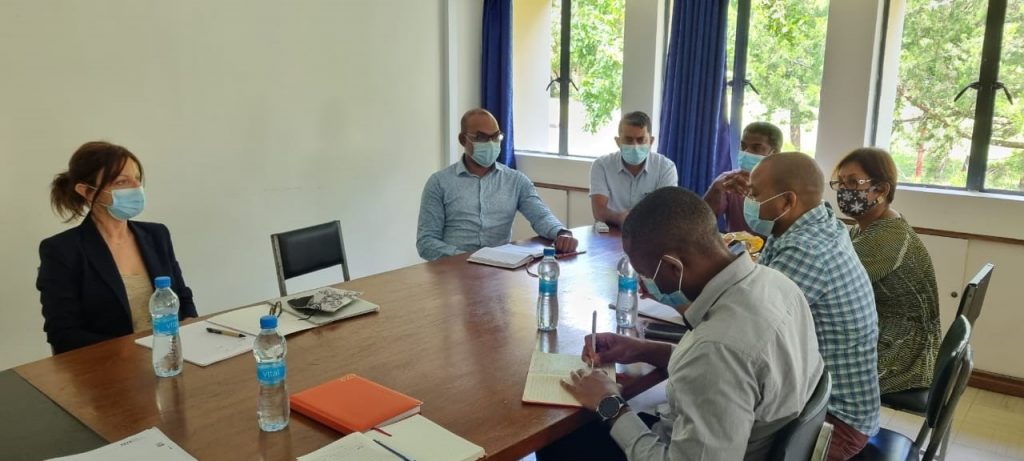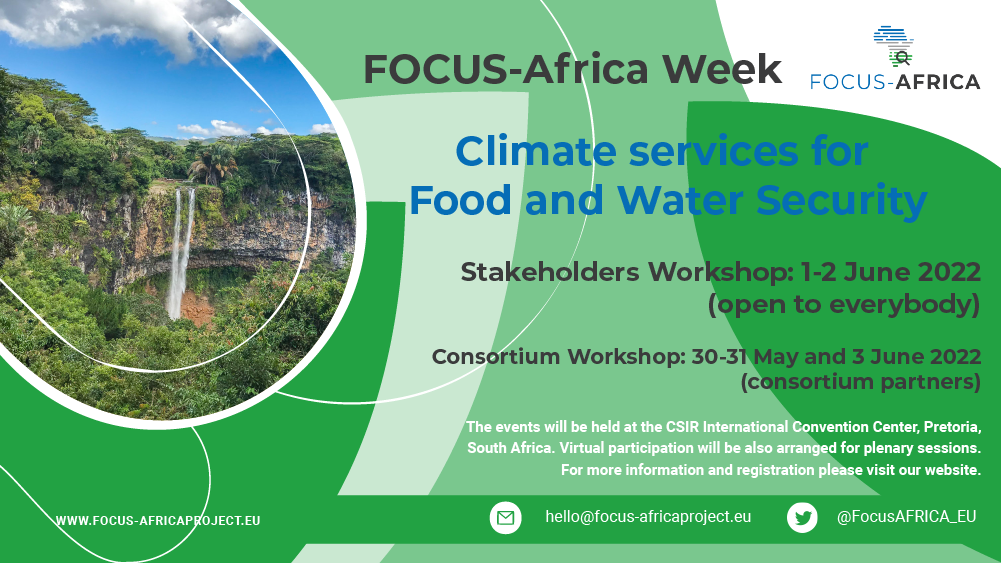This second issue of FOCUS-Africa Newsletter coincides with the first mid-term review of the project. Yes, we already reached 18+ months of implementation while employing our creativity, innovation and efforts in order to minimize the impacts of COVID in our plan of actions so far.
Several tasks have been successfully completed, especially with the team led by MetOffice looking at the regional climate processes. By analysing the simulations of the most recent climate models for the SADC region, they all indicate an increased air temperature trend toward the end of the century. Such agreement, however, doesn’t hold for precipitation: there is a general reduction projected across the region but with large discrepancies among the climate models. The case studies need to consider this large uncertainty in developing the climate risk-based decision-making tool. Especially, the users should understand the implications of using such unreliable climate information in their decision-making process. The team also analysed the predictability of the seasonal and decadal forecasts in the region, for those relevant and applicable to our case studies. High predictive skill for seasonal forecasting is found during the summer season and associated with the phenomenon of El Nino Southern Oscillations. In winter, however, the seasonal prediction has high uncertainty due to the dominating role of internal variability. The suggested way to reduce such uncertainty is to develop a better system of initialization and data assimilation.
The work package looking at the climate services requirements and user’s challenges, led by CSIR, faced challenges in collecting information and engaging with the users due to the travel limitations imposed by the COVID emergency. The first stakeholder workshop, despite in virtual mode, was useful to identify the key issues and user requirements in the various sectors of interest. Common aspects include the need for greater knowledge sharing among scientists, public institutions and local communities, and enhancement of the technical capacity among users to understand the climate information, data robustness and uncertainties.
A methodology to assess the socio-economic impacts of the project climate services was developed by the Impact Assessment Team led by LGI. Using the Global Indicator Framework for the Sustainable Development Goals (SDGs) as a common framework to identify the thematic impact indicators and stories, the methodology identifies four impact categories common to all the FOCUS-Africa case studies: 1) inclusive economic growth, 2) food water energy nexus, 3) governance, innovation, partnership, and capacity building and 4) climate change and disaster resilience. Co-design and stakeholder engagement are at the core of this approach, which means that the process has to be flexible and tailored to the reality of the local context and to the changes that can occur throughout the project.

Efforts to provide effective climate services globally will only be successful if capacity is systematically built to enable all countries to manage climate risk effectively. The capacity building team, led by ACMAD, carried out an initial assessment of the National Meteorological and Hydrological Services regional capacity gaps and development needs based on the WMO Competency framework for Climate Services. The responses to the questionnaire “Checklist for climate Services Implementation” indicated that significant challenges are found in climate data management and processing, and climate services monitoring and evaluation. An action plan for developing adequate training materials and capacity development programme has been proposed.
Since the Newsletter’s first issue, we had a full year of virtual events in line with the execution of our Communication and Dissemination Plan, including the 2nd Stakeholders workshop in September 2021 preceded by the 1st Consortium General Assembly and the 2nd Advisory Board Meeting. It is worth mentioning that in between COVID’s successive waves, our team for the Case Study on Food Security in Mozambique met in October 2021 for the first time in person in Maputo. Together with members of the Work Package 6 (impact team), the group carried out a field trip to the villages in the northern part of the country to meet with the smallholder farmers. This mission was successful, enabling a better understanding of the socio-economic context, needs and practices of smallholder farmers as well as assessing the local expertise, capacity, and systems to foster the legacy of the project outcomes. Such a positive outcome inspired the project consortium to replicate this field trip to the other countries involved in the Case Studies, namely: Mauritius, Tanzania, Malawi and South Africa. Just before the publication of this Newsletter, the team involved in the Case Study on water resources in Mauritius successfully completed the mission in the Indian-Ocean Island, meeting with five institutions dealing with water and agriculture sectors and developing a plan for tailoring climate information to meet their needs. Field trips in Tanzania and Malawi are planned for May and July 2022.
We all now hope that the COVID is finally behind us, and we are excited to meet for the 3rd Stakeholders Workshop to be organized in hybrid mode in Pretoria, South Africa from 30th May to 3rd June 2022.
Finally, I would like to acknowledge ACMAD for deploying local consultants in Mauritius, Botswana and Tanzania to ensure that strong engagement is sustained with the following partners: Mauritius Meteorological Services, SADC Climate Services Center and Tanzania Meteorological Agency. These entities were initially included in the FOCUS-Africa project design, however, due to administrative issues, they could not figure officially as members of the approved project consortium. The local consultants are supporting to a very great extent the case studies users’ engagement and proved to be key facilitators for the success of the field trips.


